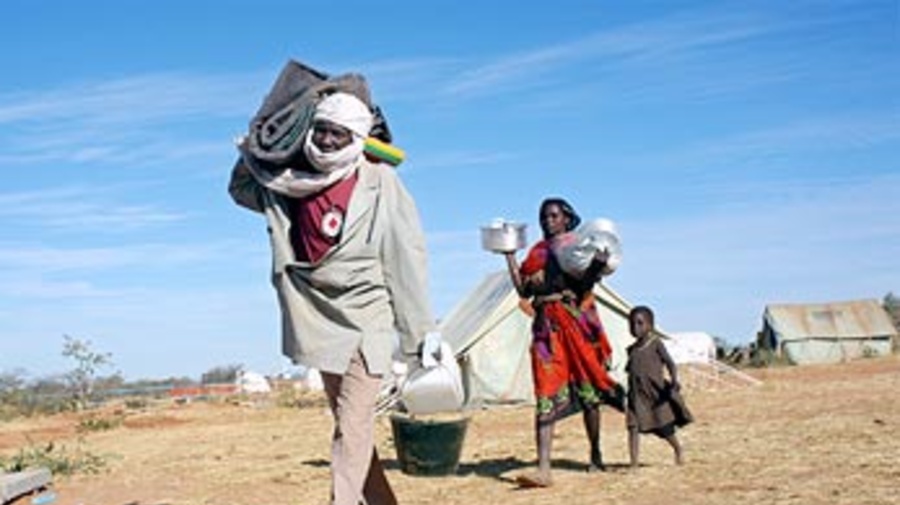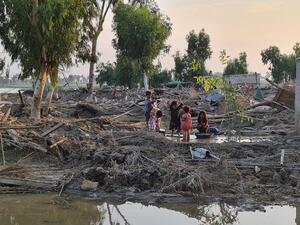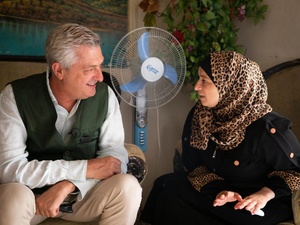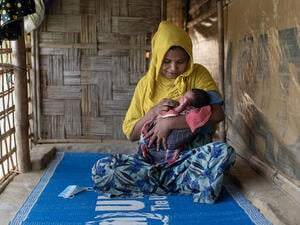UN refugee agency appeals for emergency funds for Sudanese refugees
UN refugee agency appeals for emergency funds for Sudanese refugees

After receiving emergency assistance, new arrivals from Sudan are escorted by an aid worker to a tent in Farachana camp in Chad.
GENEVA, Jan 30 (UNHCR) - The UN refugee agency today made an urgent appeal for funds to help up to 135,000 Sudanese refugees in the border region of Chad amid a bombing attack that underscored the need for the immediate relocation of thousands of new arrivals.
"Funds are urgently needed because we are in a race against time to relocate refugees from the volatile border area to safer sites farther inside Chad," said UNHCR spokesman Kris Janowski.
Last September, the agency appealed for $10.3 million for 2004 to protect and provide assistance to some 65,000 refugees. No contributions have so far been received and the appeal is now being revised as the year-long conflict in Sudan's Darfur region has intensified. Some 30,000 new refugees arrived in Chad in December and another estimated 18,000 came this month.
The refugees are scattered in Chad's 600-km desert frontier along Sudan, under a scorching sun during the day and freezing temperatures during the night. Access to the refugees in this isolated area is difficult, requiring UNHCR staff to drive for days to find them.
On Thursday, UNHCR was on the Chad side of Tine, separated by a dry river from Sudan, when the other side of the border was bombed several times. The team withdrew and was later told by Chadian authorities that at least seven explosions rocked the Red Hill area outside Tine, leaving at least two Chadians dead and 15 others wounded, mostly women and children. Two of them were in serious condition.
Thursday's bombings underscored the need for funding, to relocate the refugees to safer sites. UNHCR need to move up to 110,000 people before the start of the rainy season in May, when the sandy roads will become impassable.
"We are extremely concerned about the deteriorating situation for Sudanese refugees in Tine," said Janowski.
A UNHCR protection officer and field security assistant remained in Tine-Chad until the end of the day to monitor the situation together with the local authorities, while the rest of the team was being temporarily relocated to Iriba. The team had already registered 1,045 refugees on Wednesday in Red Hill, a refugee site 3 km from the centre of Tine.
Sudanese refugees have been gathering in the past weeks in this area, after fleeing bombing in Tine-Sudan and surrounding villages and attacks by militia. The UNHCR team was hoping to complete registration in other refugee sites in Tine when the explosions occurred.
More than 5,000 newly arrived refugees have been registered so far in four other sites between Birak and Tine. UNHCR and the Chadian refugee agency CNAR (Commission Nationale d'Accueil et de Réinsertion des Réfugiés) have registered 1,759 refugees in Andour, 1,350 refugees in Ouaddi Ogona, 1,217 in Kabraba and 762 refugees in Kourikele. The four sites are all between 7 and 23 km from the border with Sudan.
Refugees will then be transported to a transit centre at Kounoungo, 18 km from Guéréda, before moving to the camp itself at Kounoungo which is currently being readied to receive the refugees. The new arrivals fled intense fighting in Sudan on January 16. They said their villages were bombed by aircraft and attacked by armed militia who looted and burned their houses and stole their cattle.
Meanwhile, more than 1,000 refugees have been relocated from border sites south of Adré to the first established camp at Farchana. Wednesday's convoy moved 201 people from Wandalou and Absogo on the border. Another convoy, the sixth so far, today transported 317 refugees in a stepped up movement to Farchana, which will be able to host up to 12,000 people. Twenty trucks are arriving next week to help speed up the relocation.
A site near the village of Mile, 25 km north-west of Guéréda, has been selected as the third camp for relocating refugees. Hydrologists from NCA (Norwegian Church Aid) will arrive this weekend to begin working with UNHCR to set up the camp. More water experts from the German agency THW (Technisches Hilfswerk) are also arriving in coming days to help identify additional sites.
A UNHCR team leaves today for Goz-Beida, in the south, to talk to local authorities about identifying a camp site in that region.








